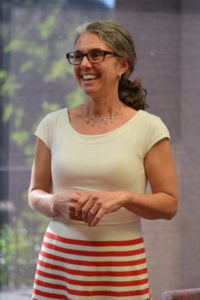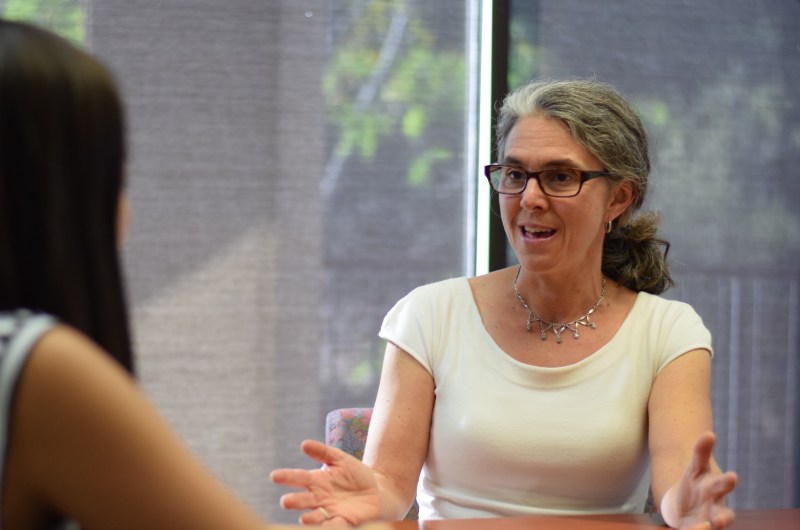Susie Brubaker-Cole, the new vice provost for student affairs (VPSA), returned to Stanford this fall after a nine-year career as the VPSA at Oregon State University. She previously worked at Stanford from 2000 to 2008 as the associate vice provost for undergraduate education and also lived as a resident fellow in Freshman-Sophomore College (FroSoCo). She began her transition into the role on Sept. 11 and officially took over on Oct. 1 from former VPSA Greg Boardman. The Daily sat down with Brubaker-Cole to discuss her previous experiences at Stanford and Oregon State, her thoughts and plans for this upcoming year and her long-term goals at the university.
The Stanford Daily (TSD): Can you briefly describe what you do as the VPSA?
Susie Brubaker-Cole (SBC): I’m the senior leader at the university charged with overseeing many

components of students’ experiences, for [the] most part outside of the formal classroom setting. It’s my role to be a key connector between the broader university and students and their experiences: to learn about their needs, desires and hopes, to know what’s going really well, what some of the challenges are and helping to make sure that there’s always a voice around large leadership tables at the university representing what students experience. I work with 25 departments and 300 professional staff — everything from residential education to the registrar’s office. Student affairs is charged with ensuring that community and belonging happens everywhere for students when they’re not in their formal academic programs.
TSD: What drew you to a career in student affairs?
SBC: I love to observe how students learn and grow, how they discover interests and how they find their pathways in life. I believe a lot of that happens in their courses and in choosing programs of study, but also outside of the classroom: interacting in different communities, learning from friends and peers and being challenged in all parts of managing independence. I feel personally passionate about helping students make the most of their time outside the formal classroom and ensuring they have the opportunity to grow and develop, not just intellectually, but emotionally, socially and personally in their roles as community members.
TSD: What are your goals for this year?
SBC: Listen, listen, listen. A lot has changed at Stanford; students have changed in step with many different changes in society. My first priority is to listen and learn about the recent past of Stanford, but also about what students are experiencing today: where they feel they’re well supported and thriving and where they feel they’re struggling and need more support. I’ve seen very clear signs that Stanford cares deeply and acts upon the need for more inclusion, diversity and equity on campus, and this is already a priority of mine. I want to create more synergy and connection between experiences that students have in the classroom and various academic programs and experiences they have out of the classroom. There is a tremendous opportunity to create more resonance on campus in a way that will ultimately result in a whole that is greater than the sum of the parts.
TSD: What is the biggest change you’ve experienced here?
SBC: I was so thrilled to meet a number of students who identify as first-generation, low-income. Those students speak about that component of their identity with great pride and with great gratitude to community centers on campus for helping to affirm that that’s a huge part of who they are and who they are at Stanford. Nine years ago, I don’t remember ever hearing a person identify that way; it wasn’t really talked about, and I think that’s a profound change.
The presence of the arts on campus is totally different, partly because of wonderful renovations to the Roble Arts Gym as well as the new Bing Performing Arts Center, so it’s really wonderful to see the arts thriving on campus in ways I didn’t observe in the past.
I’m also hearing more people talk about mental health and sexual violence. We have to remove the stigma and create regular campus conversations, because the longer things remain stigmatized, the more people are going to suffer. It’s very positive to hear that in very open terms as a frequent topic of conversation.
TSD: There were some controversial decisions made last year, with the new alcohol policy, the banned band and the changes with Full Moon on the Quad. What are your thoughts on these?
SBC: I only really know about the alcohol policy; I’m aware the band was suspended but understand it’s now been reinstated, and I was not aware of any changes in Full Moon on the Quad. I will say that I love the band and its irreverence; I went on Band Run this year! On the alcohol policy: I am glad that there’s a pilot underway to change the culture around drinking on campus, because it’s a critical issue for student wellbeing and for students’ ability to be as successful as they can be. There’s some preliminary data from the change in the policy that indicates it’s headed in a positive direction, and I’m glad it’s being treated as something being studied very carefully.
TSD: What are your long term goals?
SBC: This is not just my goal, but also a campus goal: to eliminate sexual violence on campus. I also want to ensure that community centers on campus have excellent support and are able to support all the students who are seeking to participate in the communities there. I am interested in thinking about how student affairs and the university as a whole cares not only for individuals, but also the broader community in times of crisis or difficulty. I am interested, very long-term, in the possible need for a university commons or different type of student-union space on campus as a place where students can gather centrally on campus and rest and relax outside of the residences.
TSD: What are you most looking forward to this year?
SBC: Getting to know students. I think one of my main roles is to be a translator between the administration and students. I have my own group of freshman advisees, and I’m really enjoying that. It’s really important that I’m in close contact with students and constantly learning more about their experiences. It has been a true joy to receive the warm welcome that I received in coming back to Stanford.
Contact Veronica Kim at vkim70 ‘at’ stanford.edu.
